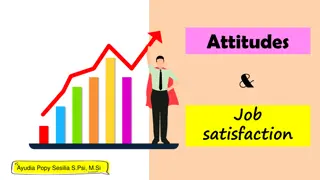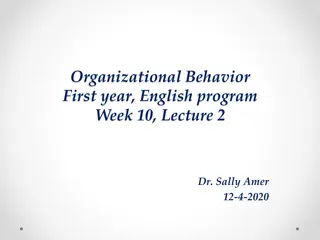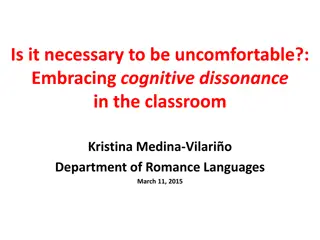Understanding Attitudes and Job Satisfaction
Attitudes play a crucial role in shaping our feelings towards objects, people, or events, influencing our behavior and job satisfaction. Components of attitudes include behavioral, cognitive, and affective aspects. Cognitive dissonance arises from conflicting attitudes or behavior. Major job attitud
1 views • 17 slides
Understanding Emotional Labor in Organizational Behavior
Emotional labor involves employees expressing organizationally desired emotions during work interactions, impacting job performance. Employees may face emotional dissonance when projecting one emotion while feeling another, leading to surface or deep acting. Affective Events Theory (AET) suggests th
0 views • 19 slides
Embracing Cognitive Dissonance in the Classroom: Addressing Uncomfortable Topics
Explore the necessity of discomfort in discussions, learn how to address sensitive topics in the classroom, and promote productive conversations. Professor Kristina Medina-Vilario delves into identifying uncomfortable topics, understanding their origins, and offering alternatives for discussion.
1 views • 37 slides
Understanding Psychological Challenges in Teaching Global Perspectives
Exploring the impact of psychological biases like actor-observer bias, confirmation bias, and cognitive dissonance on teaching global perspectives. Insights from James Dawes shed light on how our perceptions and judgments are influenced by internal biases, affecting our ability to embrace diversity
0 views • 31 slides
Exploring Sound and Silence: A Poetic Journey Through Cacophony, Dissonance, Euphony, Elision, and Ellipsis
Dive into the world of poetry where words dance harmoniously or clash discordantly, exploring the beauty of euphony and the chaos of cacophony. Discover the art of omitting syllables in elisions and the power of subtle omission in ellipses to create profound meaning within verses.
0 views • 5 slides
Exploring Spanish Citizenship for Sephardic Jews: Language and Culture Requirements
The Law 12/2015 grants Spanish citizenship to descendants of Sephardic Jews, emphasizing language and culture proficiency through exams such as DELE A2 and CCSE. The presentation delves into the impact of Law 1/10/2015, the dissonance between Judeo-Spanish and modern Spanish proficiency requirements
0 views • 40 slides





